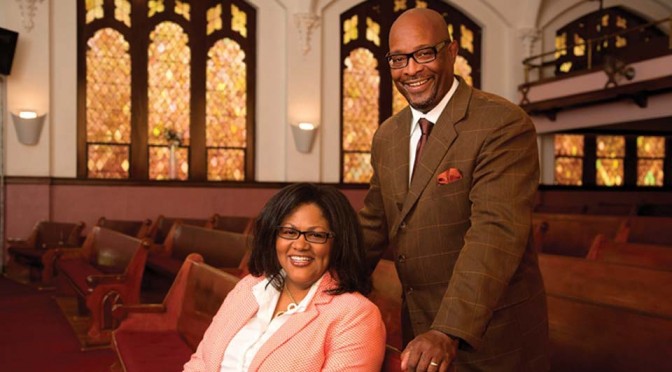A theme of healthy living runs throughout Calvary Temple Baptist Church at 29th and Holmes in Kansas City, a longtime collaborator with the University of Missouri-Kansas City Community Health Research Group. There are stacks of black health magazines, HIV prevention posters and, most profoundly in the Calvary Community Wellness Center, rows of treadmills and elliptical trainers and a rock-climbing wall.
People often ask Calvary’s pastor, the Rev. Eric Williams, why this focus on health — at church?
“I’ve comforted people who have had amputations because of diabetes,” Williams says. “I’ve talked to people on their deathbeds who wish they had exercised more or who wish they hadn’t smoked so much. We half-joke that we have funerals for church members, bury them and then come back to the church and eat the food that killed them. Macaroni and cheese, collard greens with ham and fried chicken.”
Williams, who once thought exercising was a luxury, practices what he preaches now by making much healthier choices.
African Americans top the charts in nearly every health disparity, says Jannette Berkley-Patton, director of the UMKC Community Health Research Group and assistant professor in the UMKC Department of Psychology. She is the primary investigator of an $850,000 National Institute of Minority Health and Health Disparities grant that’s focusing on African American health disparities in church-community settings.
The KC FAITH Initiative will address diabetes, heart disease and stroke by developing a pilot church-based health intervention study that will include education, screening and linkage to care strategies. Eleven local churches identified the focus of the initiative through a faith community health needs assessment survey. Six local churches will be involved in the pilot intervention.
“Life expectancy for African Americans is four years shorter than whites, even with all of the medical advances in this country,” Berkley-Patton says. “We are working closely with churches to bring about changes in health, particularly for chronic diseases like HIV, STDs, and, more recently, with a focus on diabetes and heart disease and stroke.”
Berkley-Patton also is the principal investigator of a National Institute of Mental Health-funded project, “Taking It to the Pews,” to examine religiously-appropriate HIV testing intervention strategies in African American churches. Now close to 30 churches in the Kansas City region — and 10 in Montgomery, Ala. — have used “Taking It to the Pews” toolkit materials and activities that include HIV education and testing strategies that can be infused into their church services.
Calvary Community Outreach Network is co-developer of Taking It to the Pews.
“In recent years, evidence-based practice and strategies have made a difference with HIV and AIDS,” Williams says. “Now is the time to do those same things with diabetes, heart disease and stroke.”
Health factors affecting African Americans
- Unhealthy housing
- Poor air quality
- Lack of health insurance
- Lack of Influenza immunizations
- Lack of colon cancer screening
- Infant deaths
- Heart disease
- Homicides
- Obesity
- Asthma
- HIV
- Diabetes
- Hypertension

